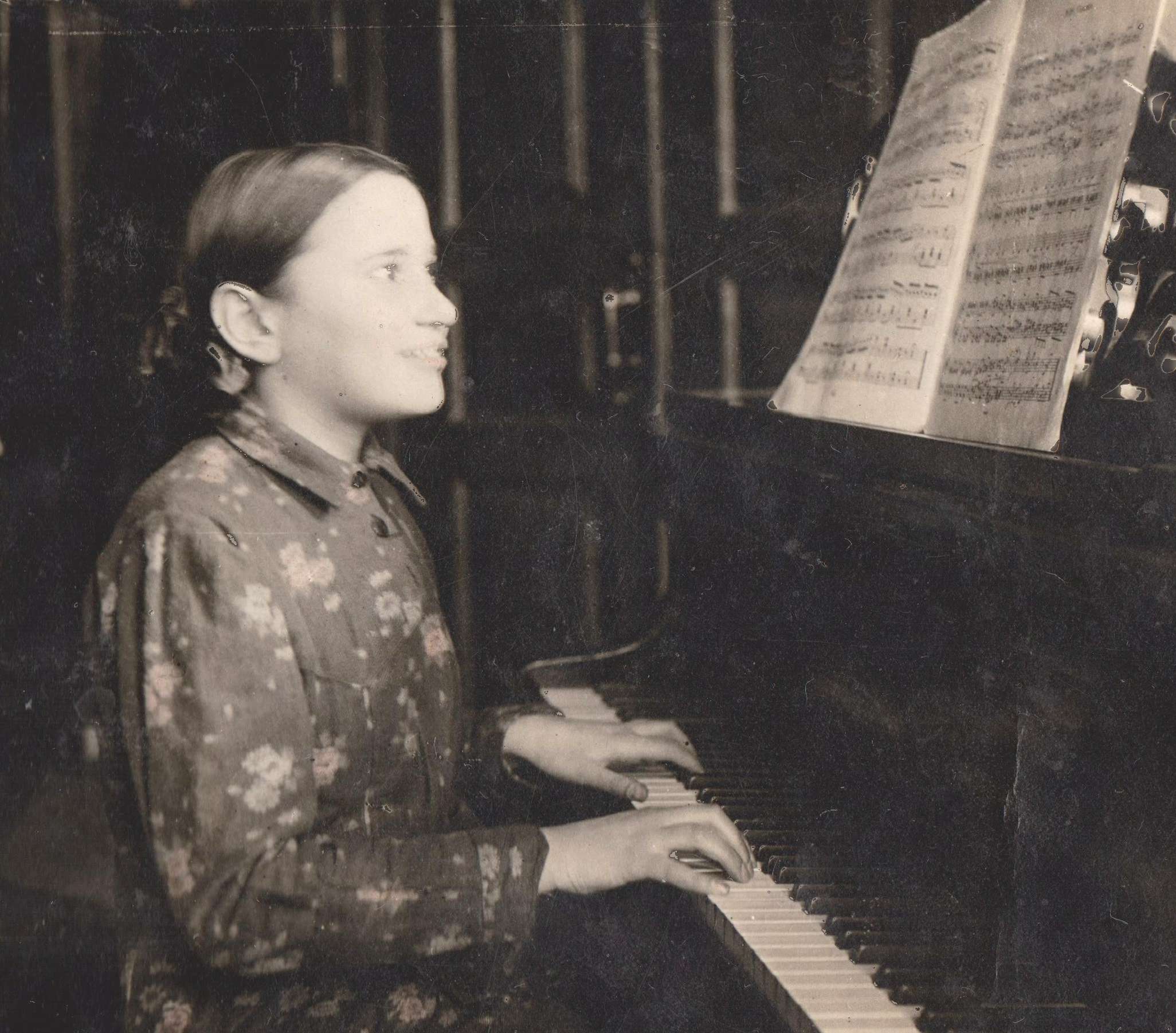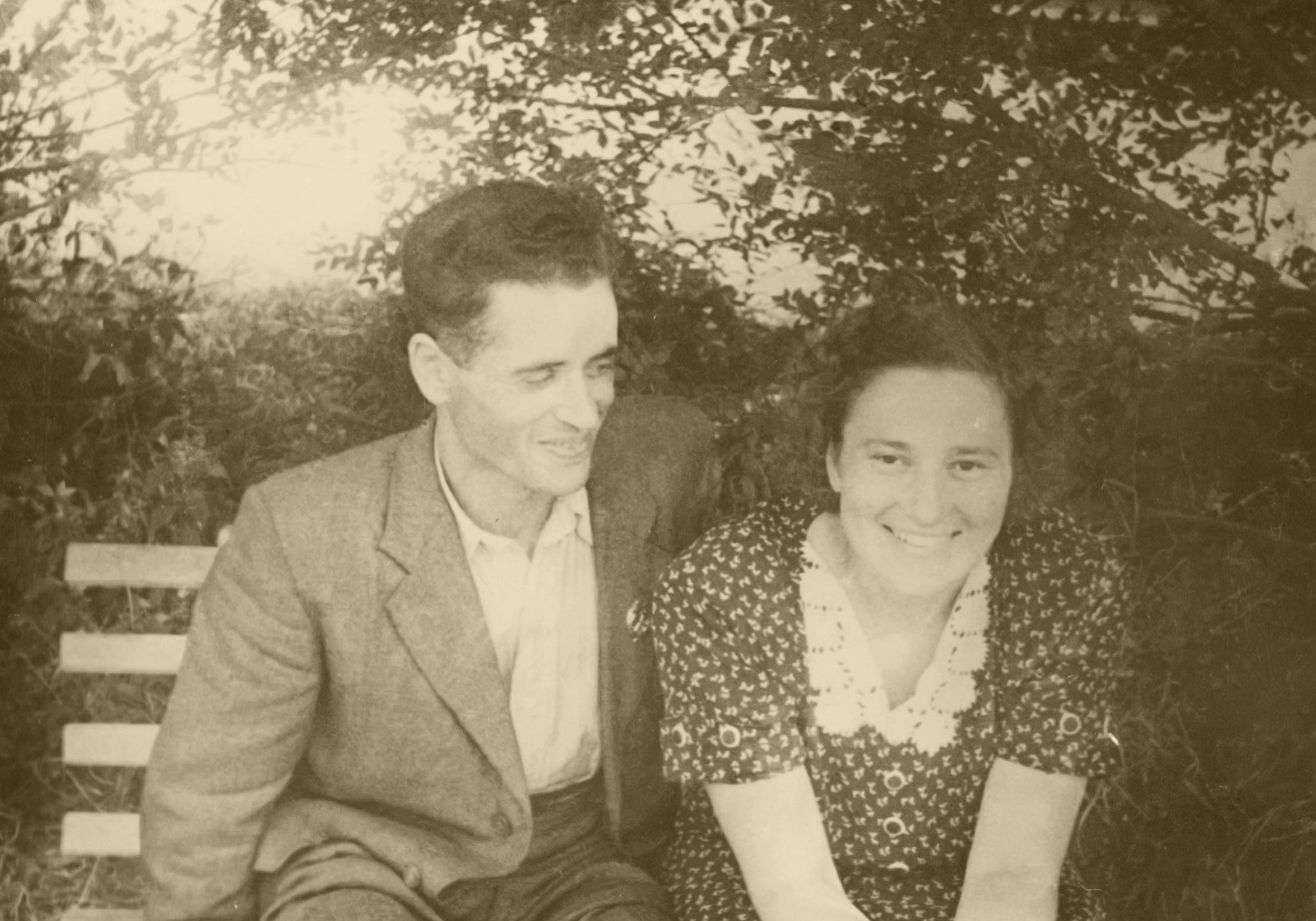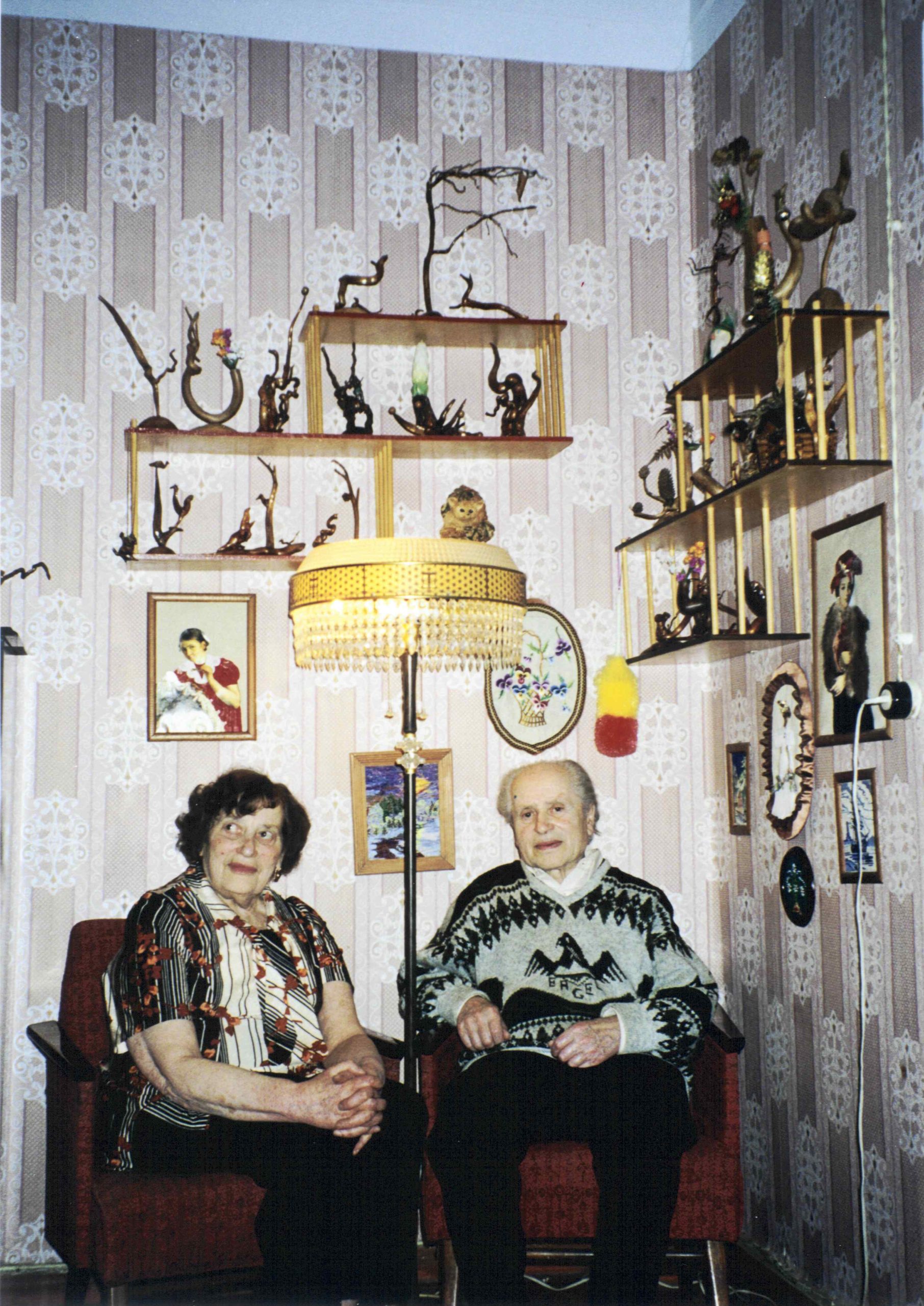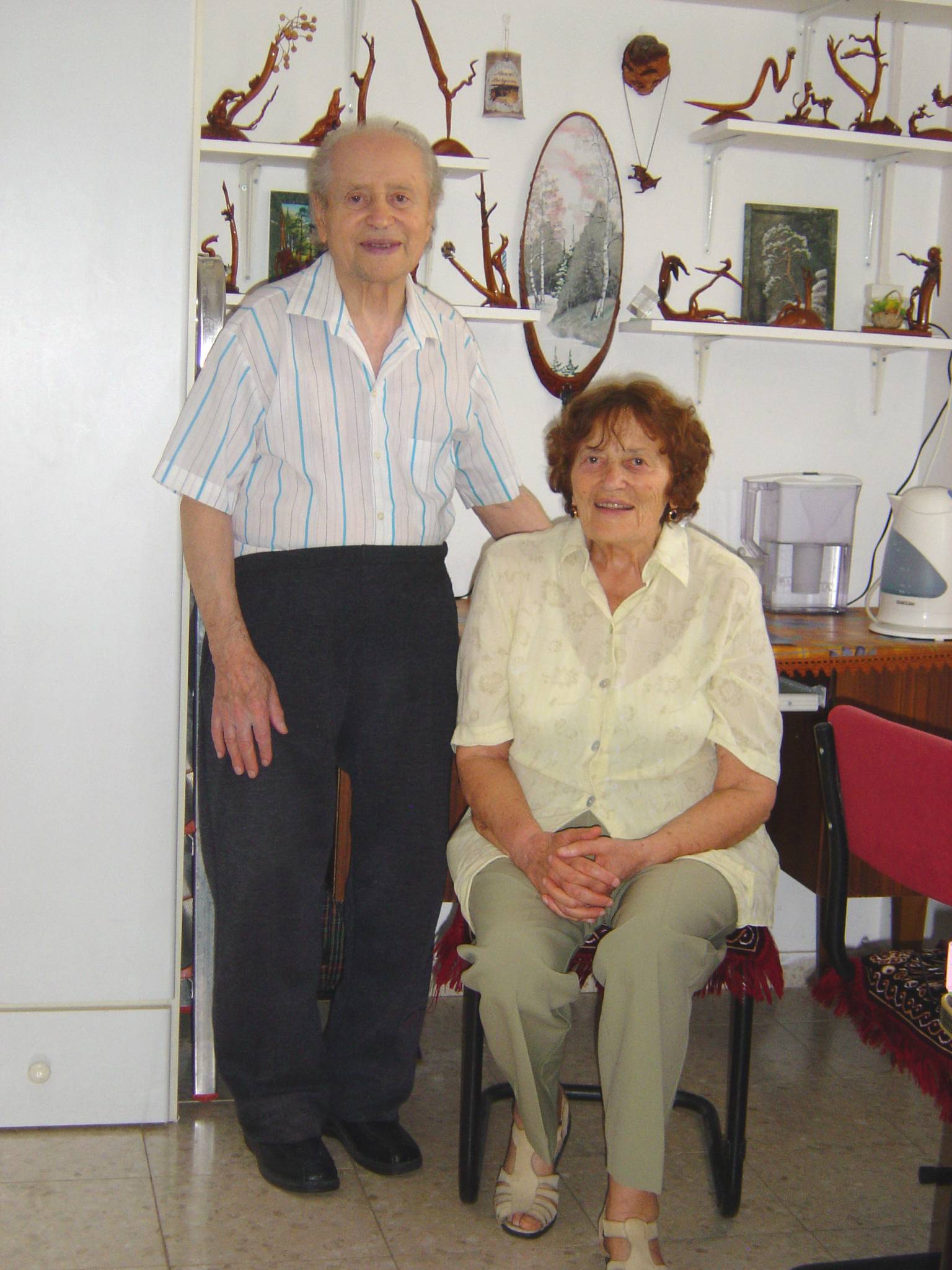SOLOMON & ESTHER

ESTHER
Esther was born in 1927 in Minsk, the capital of Belarus, to Lazar, a paediatrician, and Rosalia, who was a dentist. The city of Minsk saw rapid development in the 1920's and 1930's, with the establishment of new factories, schools, colleges, hospitals, theatres, etc. By the start of World War II, the population was 300,000.
In 1941, when Russia entered the war, Lazar was conscripted and sent to the Front.
Esther (13) was evacuated with her mother and brother, 1,500 miles east, to the town of Degtyarsk, 42 miles west of Sverdlovsk (renamed Yekaterinburg in 1991) in the Urals.
Sverdlovsk, a key city in the Russian Revolution, is the place where the Tsar and his family were murdered in 1918. During the 1930's it was developed as a centre of heavy industry. During World War II, many State technical institutions and whole factories were relocated there away from war-affected areas.
At school Esther studied music, especially the piano. In 1946 she trained as a teacher in Chelyabinsk, 150 miles south, after which she taught Russian Language and Literature in a school in Sverdlovsk.
It was in this vast city that Esther was to meet her future husband, Solomon.
SOLOMON
Solomon was born in 1923 in a shtetl (Jewish settlement) in Poland, about 80 miles north of Warsaw. Sadly, both his parents died while he was still a young lad, yet those who took care of him brought him up to understand his roots as a Jew. He thus developed a hunger to be part of Israel.
As Germany invaded Poland in 1939, Solomon and his brother fled on foot with others to Warsaw. Unable to stay there due to the approaching Nazis, they walked a further 90 miles under the protection of the Soviet Army to a neutral zone. A Soviet Officer warned them they had to leave, and they managed to take a train to Bialystok. As Jews, they were asked many questions and then sent out to work. Solomon and his brother were dispatched to different power stations.
In June 1941, all Jewish youth were rounded up by the Russians to be sent east. As German planes were bombing the railways, they had to walk up to 50 kilometres a day. A few weeks later Solomon arrived at a military camp in Voronezh. Those from Poland were ordered by Stalin to work in the military industry, and Solomon found himself in a special battalion to prepare military signalmen. He was then sent to work at a metallurgical plant in Novosibirsk, Siberia. At the end of the war, he was awarded a medal for his work.
After the war he moved to Sverdlovsk. He worked in the daytime in a medical factory and in the evenings, he finished high school. This enabled him in 1948 to enter Sverdlovsk Mountain Institute.
MARRIAGE
After he graduated as an electro-mechanical engineer, he married the love of his life, Esther. His various jobs included working as a mining engineer and later as a designer for construction work. He retired in 1983.
Poverty was rife in Degtyarsk. Solomon and Esther lived in a cold, damp flat in the city of Degtyarsk, an hour’s drive from Yekaterinburg. Anatoly, a base leader with Ebenezer, started visiting them in 2000, sometimes taking food or medication to them to supplement their meagre pension. They so enjoyed his visits, especially when he sang Hebrew songs to them. Anatoly talked to them about making Aliyah. As Solomon and Esther only had a government pension, they often asked Ebenezer for aid. Their apartment was cold and damp, and the inclement weather was far from healthy for them. Anatoly took them much-needed medicines every few months.
For two years he visited and shared with them about Israel and the possibilities of making Aliyah. Gradually their friendship grew as Esther and Solomon found they could trust him. Each time they asked him to sing Hebrew songs, and these impacted them deeply. However, he discerned a real fear and uncertainty in their hearts.


HELEN’S VISIT
When Helen was invited by Ebenezer to share at their base leaders’ conference in Moscow, she met Anatoly who told her about Solomon and Esther. Anatoly was very keen to take Helen to visit this precious couple, even though he believed they did not want to make Aliyah.
Helen visited Yekaterinburg for a few days. It was bitterly cold, down to -30°. On the morning of her visit to Solomon and Esther, the vehicle refused to start due to the diesel being frozen. Anatoly finally managed to start the car after two hours of dogged determination and much prayer! On the highway a suspicious noise from the engine caused them to pull over, but they prayed and miraculously they made it to Degtyarsk.
Esther was gifted artistically and had made many little statues and ornaments from roots she found on the banks of rivers and lakes, as well as decoupage using materials and paper.
These she displayed in exhibitions as well as in her home.
Helen described life at Beit Haverim to Solomon and Esther, showing them some photographs. Esther was delighted, and very enthusiastic to go, but Solomon was extremely hesitant.
He said he didn’t want to be a bother to anyone! Having one daughter in Israel, and the other daughter in Yekaterinburg, each with their families, made it a very difficult decision.
With Solomon unconvinced, Helen did not even complete application forms for them. At that time, the only double room at Beit Haverim was reserved for a mother and daughter who lived in Perm, a city further north.
Over the next few days Esther talked Solomon round, and he agreed to go to Israel. At the same time, the two ladies in Perm changed their minds, so releasing the room for Esther and Solomon.
What timing!
PREPARATIONS FOR MAKING ALIYAH
Anatoly wasted no time in completing forms and getting Esther and Solomon to the Israeli Consul, who only visited the city once every two months. The Consul said he didn’t even have to look through the papers; just one glance at their faces was quite enough! It was plain to see they were Jewish! He said there would be no problem with visas, and they could prepare all their documents. Anatoly said he had never seen Esther and Solomon so happy!
When their passports were ready, Anatoly took Esther and Solomon to the Russian Office of Visas and Registration in Yekaterinburg. They were told they needed to be unregistered. For this “unregistered” stamp to be put in their passports, they each had to pay 20 roubles through the bank, within three days. Anatoly discovered all the banks were closed, and he was very concerned as they did not want to miss the next Consular visit.
He prayed hard. Amazingly the Consul was delayed by one day! This enabled Esther and Solomon to pay their fee, collect their foreign passports and the same day go to the Consul for their Israeli Visas.
The next challenge was to sell their flat, not an easy task in a buyers’ market amidst a poverty-ridden city. Many people prayed - and God answered swiftly. Esther said that a man had approached her with a good offer, on condition that they move out of the flat by 12 May! They only had 10 days to do this. Anatoly managed to get them flights to Israel for 14 May - the next flight would not have been for another fortnight.
The sale went through without any hitch. However, two days before their flight they had to get some changes made to their foreign passports.
Anatoly collected Solomon and Esther for the last time on the morning of 14 May and stopped at the visa office to pick up the passports. After a tense wait, they finally got them, and with huge relief and beaming faces they all headed for the airport.
They were on their way HOME to Israel!
BEIT HAVERIM
Two weeks after they arrived at Beit Haverim, how thrilled they were when their granddaughter visited them with their 3-month-old great grandson. If they had stayed in Russia, they would never have seen him.
Though fragile and difficult to pack, Esther managed to bring her unusual artwork to Israel. Many pieces were displayed on her bedroom walls and shelves. (We are delighted to inherit most of her handiwork which will be exhibited in our new complex.)
As a young woman Esther loved to go swimming and was full of fun! She was thrilled when given the opportunity to go swimming at Ashkelon beach, soon after arriving in Israel. Age was certainly no barrier for her! She wrote:
"Everyone forgot about their problems. We were laughing, joking and splashing about like children! Everyone looked cheerful and even younger, and one lady, shining with a smile, exclaimed, 'Look! I am still able to do something! I can do it!' That was God's blessing!"
Solomon struggled with his health and had spells in hospital. Despite that, he and Esther began to lead a Shabbat Celebration each Friday late afternoon. Esther lit the Shabbat candles, taught from the Bible readings of the week, and Solomon led Kiddush with the bread and the wine. They all sang songs in Russian, Yiddish and Hebrew, accompanied by Esther on the accordion or keyboard. This weekly celebration was purely their own initiative. The majority of the residents loved to attend too.
Esther always enjoyed walking in the park, even after Solomon passed away. She was such a bright, cheerful person, and had a very positive outlook, making friends easily and always trying very hard to communicate with those of us who did not speak much Russian!
Two young men gave Esther a magazine. It was about Beit Shemesh, written in Russian, and included an article about Beit Haverim. Esther, as a former Russian teacher, saw the mistakes in it and offered to proof-read it for them. As a result, she was enlisted to help and given a computer to use for it - no-one is too old to start!
Esther spent her last few months in and out of hospital with an infected foot, yet still maintained her sense of humour, laughingly describing her hospital gown as ‘Paris Fashion’!
She passed into the presence of the Lord just one day before her 86th birthday. Her suffering was over. Everyone sorely missed this wonderful lady and her gentle husband, and we thank God for the privilege of having known them.

